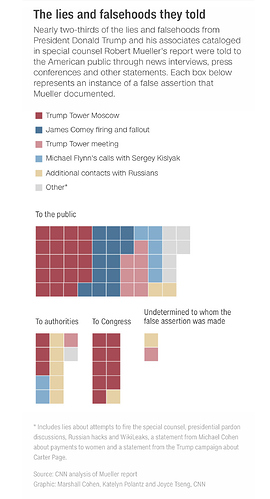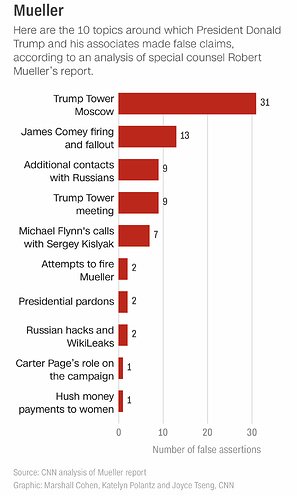The hope is that Congress/Gang of 8/public can see the Mueller Report. But how much of it can be seen or altered, via Barr is the quandary.
Read the NYT article below which weighs in on what the precedent has been and what kinds of legal arguments are at play.
Both parties are going to fight tooth and nail on releasing the report, and McConnell has already decided no. (McConnell says Mueller Report needs modifying - the Hill)
The question of obstruction has emerged as the most debated part of Mr. Mueller’s investigation. According to a summary by Mr. Barr, Mr. Mueller did not establish a conspiracy between Mr. Trump and Russia to influence the 2016 presidential campaign, but when it came to obstruction of justice, the special counsel neither accused the president of a crime nor exonerated him.
President Trump has thrown out the unwritten rules that have bound other chief executives in the 45 years since President Richard M. Nixon resigned.
Beyond those bottom-line conclusions, Mr. Mueller’s full report has yet to be released, and it remained unclear if it ever would be. House Democrats have demanded that it be sent to them by next Tuesday, but the Justice Department outlined a longer schedule, saying that it will have its own summary ready to send to lawmakers within weeks, though not months.
So far, there are no plans to give a copy of the report to the White House in advance of any public release, according to a Justice Department official.
At the heart of the obstruction question is when a president’s use of his otherwise legitimate authority under the Constitution becomes an abuse of power. When the House Judiciary Committee approved three articles of impeachment against Mr. Nixon for covering up the Watergate burglary and other crimes, it asserted that “he knowingly misused the executive power by interfering with agencies of the executive branch,” including the F.B.I. and the Justice Department.
In effect, the result was to draw a line that subsequent presidents steered clear of, no matter how frustrated they might be at times with investigators pursuing them. To prevent a repeat of Mr. Nixon’s actions, including his order firing the Watergate special prosecutor, Congress enacted a law creating an independent counsel who would not report to the president.
Since Mr. Mueller’s report remains undisclosed, it is not known how much these constitutional arguments weighed in his decision not to make a finding on obstruction. Mr. Barr argued that since there was no underlying crime of conspiracy, it would be harder to prove a corrupt intent to obstruct.
Some expressed skepticism that the line has necessarily moved. “I don’t think that means that the definition of obstruction has changed,” said Timothy Naftali, a New York University professor and former director of the Nixon presidential library. “What I think we may find is the evidence wasn’t sufficient to take on the huge battle of indicting a president.”
But the end result may be the same in terms of setting a new standard for future presidents. The hands-off attitude when it came to investigations of the past no longer applies.
“The extremes we have gone to accommodate the president’s authority are a terrible precedent for going forward as a democracy built on separation of power and balance of powers,” said Richard Ben-Veniste, a former Watergate prosecutor.
Mr. Rivkin, however, argued that the potential downside of a president interfering in law enforcement actions out of political motives was outweighed by the danger of such powerful agencies operating without anyone overseeing them.
“Do you want to have the F.B.I., C.I.A. and N.S.A. accountable to nobody but themselves?” he asked, citing “serious abuses of civil liberties” that have occurred in American history. “Choose your poison. When someone talks about the possibility of corruption, my response is what’s the alternative? Do you have a better alternative?”

 The most important revelation is buried in the middle of the article:
The most important revelation is buried in the middle of the article:



